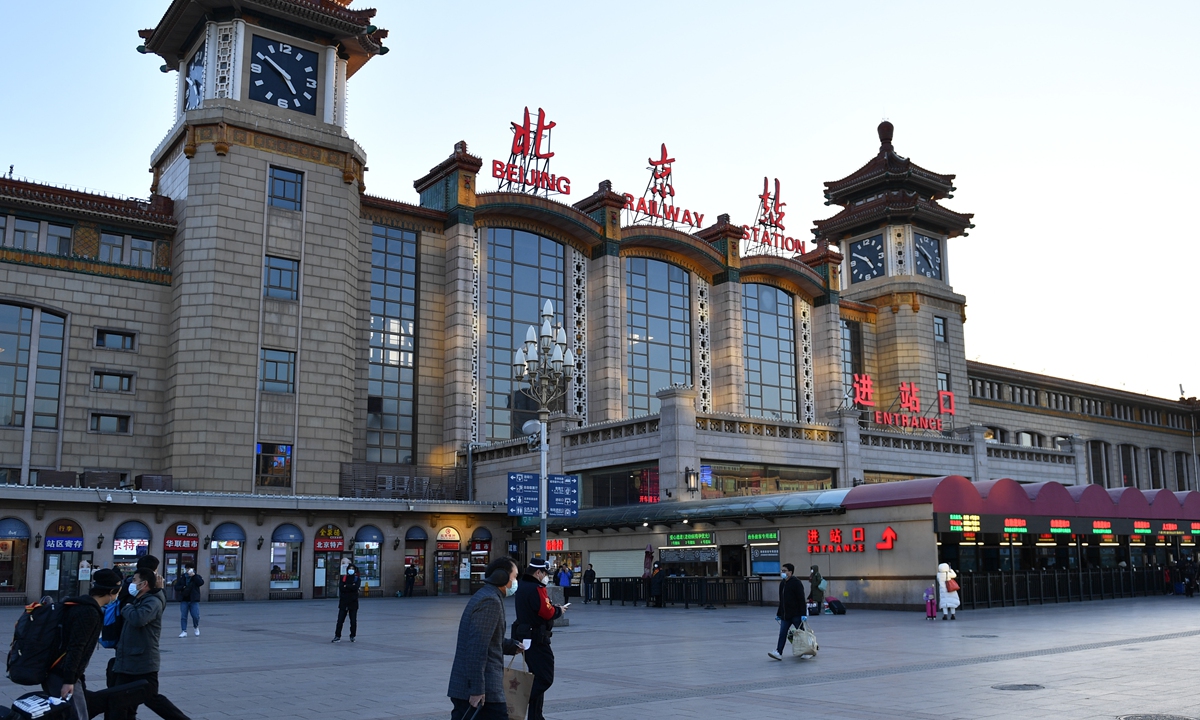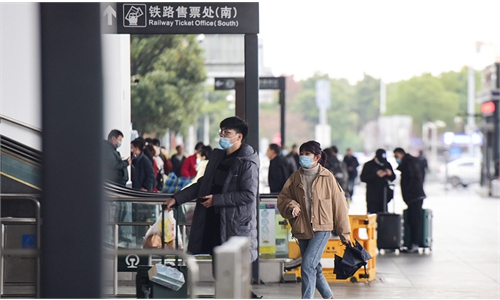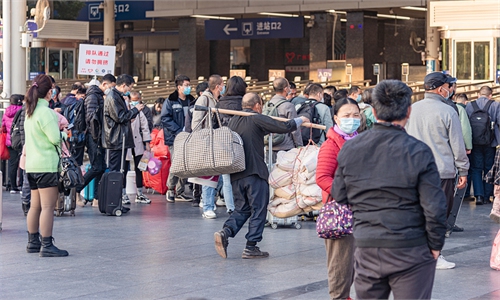China curbs viral resurgence with ‘strictest’ measures in Spring Festival
Outbreaks amid holidays could be catastrophic, just look at US: expert

Passengers at the Beijing Railway Station on Friday. Officials said on Friday that train bookings for the Spring Festival travel peak declined by 60 percent, with the total number of passengers only reaching 296 million. Photo: cnsphoto
China has rolled out measures to guide the public on their return journeys to their hometowns and urged them to stay in their working cities during the upcoming Spring Festival holidays. Among the measures are mandatory nucleic acid tests within seven days of travel, 14-day health monitoring at home and an extra bonus as a stimulus for those who choose to stay.
At least 29 provinces and municipalities have taken such steps in a bid to avert the risks of the virus' spread during the chunyun (travel rush) in Spring Festival, which is known as the world's biggest annual human migration.
According to Chinese authorities on Wednesday, this year's chunyun would see some 1.7 billion trips in total with a daily average of 40 million trips. The number is 40 percent lower than in 2019 but 10 percent higher than in 2020, officials said.
People must show negative nucleic acid test results within seven days before their trips. For those returning to rural areas, they also have to undergo a 14-day health monitoring at home after arrival, according to a national level anti-epidemic plan released by the National Health Commission on Wednesday.
During the monitoring period, they are banned from walking around and shall take nucleic acid tests every seven days. They must pay the test costs by themselves, the authorities said.
The announcement immediately became a social media trend, sparking hot discussion online. The hashtag "negative nucleic acid test within seven days for returnees during Spring Festival" garnered nearly 420 million views as of press time.
Some hailed the measures, saying they understand the need to ensure nationwide safety, but others said it is simply a one-size-fits-all approach.
Observers reached by the Global Times said such strict steps will make a large majority think twice about their decision to return home during the holidays.
Wang Guangfa, a respiratory expert at Peking University First Hospital, said that the potential risks of a COVID-19 rebound should not be underestimated, given the large scale of people who travel during chunyun. "Otherwise, previous maximum efforts that China made since last year would be in vain," he said.
One infected patient could transmit the COVID-19 virus to three people at least, which could be followed by further generation to generation transmission within six days, Wang said, and the outcome would be unimaginable.
Officials at the press conference also stressed that China is facing a grim and complicated epidemic situation, with outbreaks in several provinces and multiple chains of transmission that have surfaced in the same places.
In the past week, there were 757 newly confirmed local cases nationwide, and the number of close contacts under medical observation was at its highest level since October, officials said.
A local government official surnamed Hu from the Heguo township in Xingai, North China's Hebei Province told the Global Times on Wednesday that holding a negative nucleic acid test is mandatory for any visitors, no matter whether they came from low- or high-risk regions.
For those from low-risk regions, the negative test result within three days is required. Those from medium- and high-risk regions will face quarantines and compulsory tests, Hu said, adding that local governments have started lobbying those who work outside the township not to come back.
Companies and employers are also encouraged to hand out red envelopes or gift packages for those who choose to stay, arrange social activities or improve their pay as incentives, Chen Yongjia, an official from the Ministry of Human Resources and Social Security, told the press conference on Wednesday.
"Encouraging people to celebrate the holiday in cities where they work is expected to largely reduce population flows, which is of great significance for epidemic control," Chen said.
The Global Times has learned that some cities will distribute subsidies for remaining migrant workers, such as Hangzhou of East China's Zhejiang Province. Hangzhou will distribute 100 yuan ($15.4), while a company from Ningbo offered accommodation for married employees to celebrate the Chinese Lunar New Year.
Chinese authorities emphasized the anti-epidemic controls in villages during Spring Festival holidays, where loopholes and blind spots could exist, as the lessons of the Hebei and Heilongjiang outbreaks showed. They ordered county-level emergency response teams to remain in "emergency" mode during the festival.
Villages across the country should require nucleic acid tests for all returnees and carry out routine environmental tests on social venues such as chess and mahjong entertainment houses.
To have a safe Spring Festival, Gao Fu, director of the Chinese Center for Disease Control and Prevention, told Chinese media that everyone should develop a crisis awareness of facing a potential epidemic similar to the one that occurred in Wuhan around the same time last year.
Considering there is no cure for the virus to date, and the country has yet to achieve herd immunity as the massive vaccination program is still ongoing, the key for preventing the spread of the virus is the early detection of it among populations, according to Gao.



